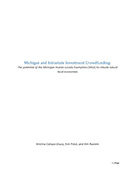
April 5th marked the three-year anniversary of President Obama signing the Jumpstart Our Business Startups (JOBS) Act into law. Among other provisions, Title III of the Act paved the way for non-accredited investors—those 93% of Americans who make less than $200,000 a year and have less than $1 million in assets—to invest directly in U.S. businesses. The bad news is that federal policy makers have failed to implement Title III. While this provision of the law remains bogged down in the SEC’s rulemaking process, non-accredited investors remain shut-out of investment opportunities and small businesses continue to struggle to raise capital.
The good news is that state policy makers in Michigan and across the country are taking matters into their own hands. The Michigan Invests Locally Exemption (MILE), P.A. 264, was signed into law on December 30, 2013, enabling businesses in the state to raise capital from accredited and non-accredited investors through intrastate investment crowdfunding campaigns. Fourteen other states have passed similar laws and at least fifteen more and the District of Columbia are considering legislation. Despite the enormous potential of MILE to democratize the investing landscape and provide much-needed capital to startups and small businesses, it has been slow to gain traction.
There is a small but mighty group of Michigan investors, entrepreneurs, and policy leaders working to change that. Chief among them is Chris Miller, the Economic Development and DDA Director for the city of Adrian. Chris has an intoxicating enthusiasm for the power of MILE and local investing, and has traveled around the state educating stakeholders about it. As part of these efforts, Chris contracted three graduate students from the University of Michigan’s Ford School of Public Policy—Kristina Campa-Gruca, Kimberly Rustem, and me—to study implementation challenges, identify best practices, and make recommendations. This process involved an extensive literature review and conversations with over 30 stakeholders from Michigan and across the country. Our findings can be found at crowdfundingmi.com in a paper titled Michigan and Intrastate Investment Crowdfunding: the potential of the Michigan Invests Locally Exemption (MILE) to rebuild robust local economies.
We offer six recommendations to advance MILE and the local investing movement in the state. The recommendations aim to establish clear leadership, strategically coordinate efforts, and increase awareness of investment crowdfunding and its potential to transform local economies. Michigan is fortunate to have a handful of policy leaders, entrepreneurs, and investors dedicated to the successful implementation of MILE. If the state can rally around these efforts, we can fully realize the potential of this legislation to strengthen local economies.

Erin Pidot is a Masters in Public Policy Candidate at the University of Michigan’s Gerald R. Ford School of Public Policy. She grew up in Maine and spent five years working in Boston and San Francisco as a housing advocate and social worker before returning to school. She has loved getting to know Michigan over the past two years.
